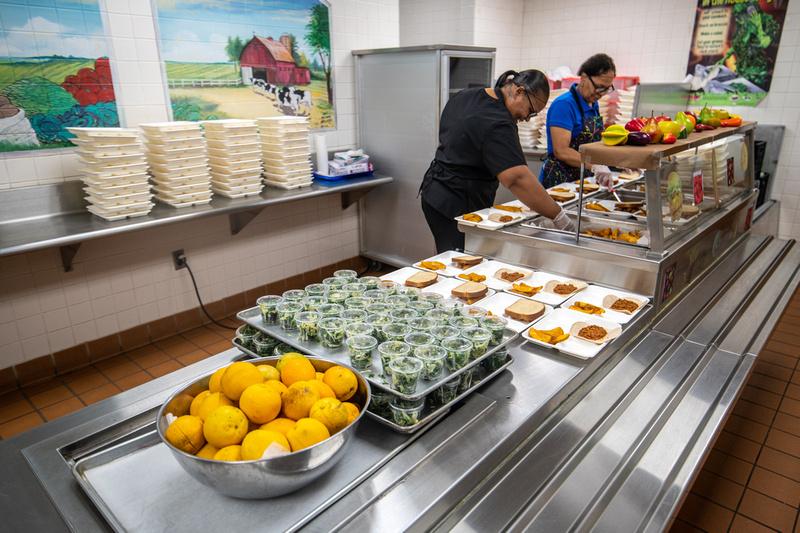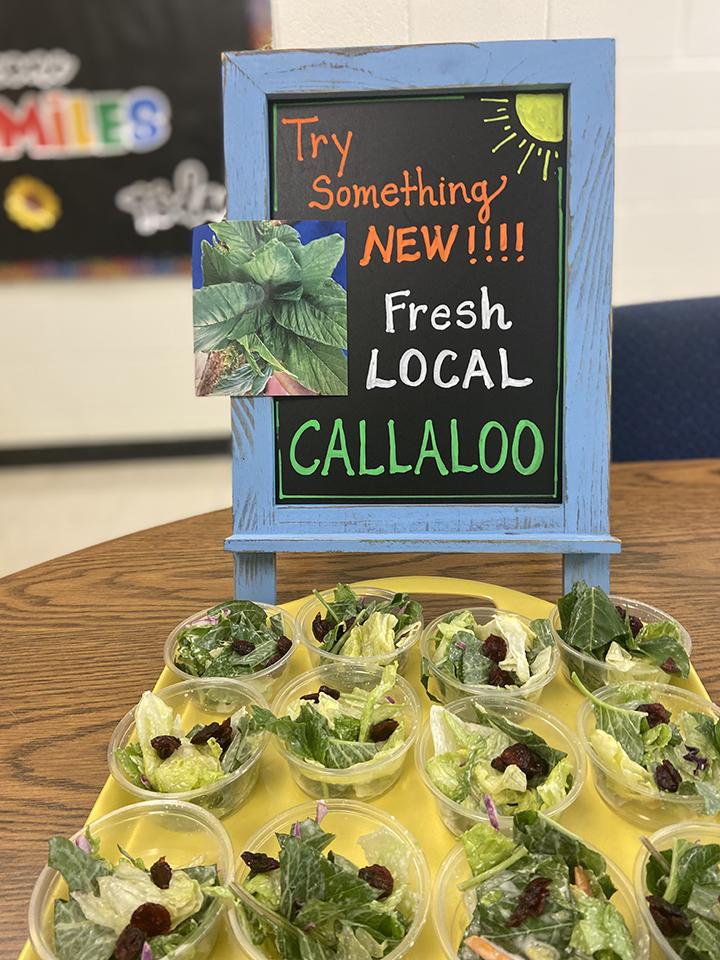PRINCESS ANNE – It was all thumbs up for elementary students in Somerset County during the Farm to School tasting of locally-grown callaloo – a Jamaican green with more vitamin K than kale or collard greens– served during the Maryland Department of Agriculture’s Homegrown School Lunch week.
University of Maryland Extension SNAP-Ed educator Christine Main helped foster the partnership to bring this new ethnic food to Somerset schools, working with local farmer Michael Edwards, owner of Wood Duck Landing Farm, and Dr. Nadine Burton, agriculture Extension agent with University of Maryland - Eastern Shore and owner of Tallawah Farms, both located in Somerset county.

Elementary cafeterias in Somerset received neon bistro boards – a fun twist proven to entice and increase vegetable selections by the kids – through the SNAP-Ed program to spotlight the callaloo, which was served to the kids as a part of a salad, aptly named the Tropical Somerset Salad – a fun combination of greens including the callaloo, craisins, and dressing. “You have to think about the kids’ minds when you’re planning this – their blood runs thick with ketchup and ranch,” said Main, who has been working with the district since 2017. “So we chose something that looked like their normal iceberg salad and added an ethnic, nutritious twist.”
It’s important to encourage kids to eat healthy at a young age, especially in Somerset County, which has the highest obesity rates in Maryland, according to the Maryland Department of Health, as well as the highest rates of weight-related issues like diabetes.
“We have about 24,000 people in Somerset and we have 42% of them dealing with obesity issues,” Main said. “So nutrition education partnerships like Farm to School are more important now than ever.”
But bringing fresh local foods to lunchrooms can be a challenge, with many factors influencing what gets served. “Food safety is always a concern for food service directors. However, our farmers have food safety certifications and they are insured,” Main said. “Food service directors typically rely on large distributors like Sysco because they can pull from vendors in all climates, but if you’re counting on a local farmer to bring in a crop, you have to have faith and flexibility in case Mother Nature prevents that from happening.”
Cafeterias also have limitations in what can be prepared and served in a timely fashion. The workers themselves have limited prep time for washing or chopping before serving. Kitchens in Somerset County schools also lack stovetops, so all foods must be prepped raw or in a “heat-and-eat” fashion

From left: Christine Main (SNAP-Ed), Nadine Burton (Tallawah Farms), Lisa Lachenmayr (SNAP-Ed), Michael Edwards (Wood Duck Landing Farm), Christa Taylor (Princess Anne Elementary Principal).
“I think cafeteria workers are really unsung heroes,” Main said. “They really do it because they love kids and they get so little recognition.” The cafeteria workers in the Somerset district were given the option to choose how the local callaloo would be prepared for the students after taste-testing three different options, prepared by Main.
Burton, who specializes in callaloo and other ethnic crops is now working to create a video to show the traditional cooking process for people to learn how to prepare it at home. Burton is also interested in adding processing facilities on her own farm to continue these types of partnerships without putting the burden of preparation on the cafeteria staff.
Wood Duck Landing Farm will continue to provide local produce to the local high school salad bars as well. “Washington and Crisfield Academy and high school cafeterias will soon have salad bars featuring local cucumbers and cherry tomatoes from Wood Duck Landing Farm, in addition to callaloo from Tallawah Farms,” said David Scott, SCPS Food and Nutrition Services District Manager. “We are proud to participate in the Maryland Farm to School program and to partner with local farmers in the Somerset community. Not only do we get to support local business owners, but we are also exposing our students to a variety of fresh foods and ways to prepare locally-sourced produce with help from the Maryland SNAP-Ed program.”
“Our hope is that the callaloo is well received so the school will add that salad to the menu on a regular basis,” said Main. “That gives continued profits to our local farmers and continued nutrition and exposure to new vegetables for our kids here in Somerset.”
SNAP-Ed programs help facilitate early childhood nutrition education in schools across Maryland, not only during Farm to School Week, but throughout the year with weekly visits to classrooms to provide tastings of local foods, and nutrition focused education through story-times and activities. To learn more about SNAP-Ed and how they serve the state, go to https://extension.umd.edu/programs/family-consumer-sciences/snap-ed.
